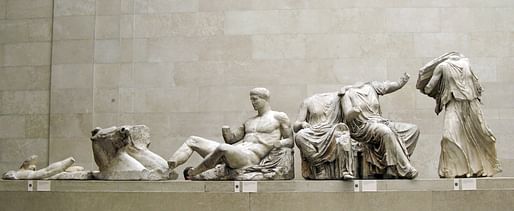

As the United Kingdom works to strike new trade deals with Europe following Brexit, Greek authorities are using the occasion to try and negotiate a return of the country's long-lost Parthenon Marbles (also referred to as the Elgin Marbles).
Reuters reports that Greek officials have included new language supporting repatriation of the marbles in a document crafted by the 27 European Union nations that will envision the group's new economic and cultural relationship with the United Kingdom following its exit from the EU on January 31, 2020.
The document, according to Reuters, seeks the “return or restitution of unlawfully removed cultural objects to their countries of origin” and comes as Greek Prime Minister Kyriakos Mitsotakis makes a formal offer to British Museum authorities, where the marbles are currently held, to temporarily trade the Parthenon Marbles for a series of ancient Greek artifacts that "have never left Greece." The exchange would take place surrounding the 2021 bicentennial of the start of Greece's war of independence against the Ottoman Empire.
The marbles were created between 447 and 438 BCE by the sculptor Phidias and were originally installed as part of a monumental sculpture program at the Parthenon of the Acropolis in Athens. The marbles were removed in 1798 by the Earl of Elgin and eventually gifted to the British government, which is why they are now on display at the British Museum. The UK and Greece have been at odds over the marbles for decades due to the unclear legality surrounding Elgin's removal of the artifacts.
According to Reuters, the British Museum has maintained that they are the rightful owners of the marbles and is therefore unwilling to repatriate them back to Greece. Museum officials tell Reuters that “the sculptures are part of everyone’s shared heritage and transcend cultural boundaries.”
The renewed debate comes as European countries, specifically France, begin to more seriously consider repatriating art objects acquired through the continent's colonial exploits. Greek authorities opened a museum at the foot of the Acropolis in 2009 that is designed to one day hold the repatriated Parthenon Marbles.
Architect David Adjaye, for example, was recently selected to design a new museum in Nigeria that may one day hold works that were looted from the country during the colonial era. Adjaye, principal and founder of Adjaye Associates, consults for the Benin Dialogue Group, an entity that brings together museum representatives from European and Nigerian institutions with the goal of coordinating the delicate task of bringing stolen objects back to West African nations.
That move is being mirrored additionally in France, where the Centre Georges Pompidou recently unveiled plans for a new "art factory" space slated for the Parisian suburbs designed, in part, to help facilitate the regional and global movement of art objects from French museums.
2 Comments
Greece is the rightful owners of the marbles.
Britain only successfully looted them.
In 1798 Greece was part of the Ottoman empire, so the marbles should be returned to Erdogan!
Block this user
Are you sure you want to block this user and hide all related comments throughout the site?
Archinect
This is your first comment on Archinect. Your comment will be visible once approved.